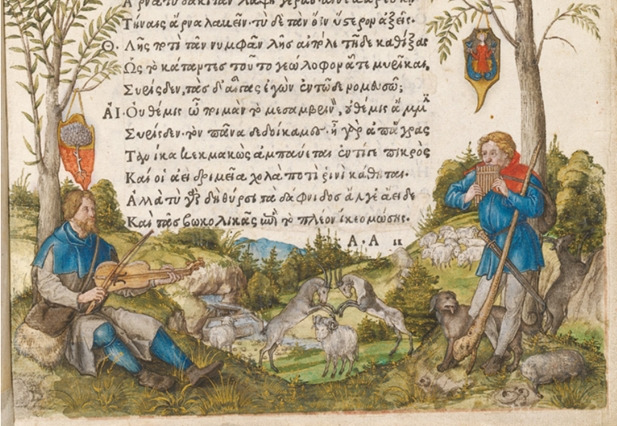Reading Under a Beech Tree • Conversations with Theocritus

By way of a flash-back through literary time, this exhibition aims to trace the echoes of pastoral song through the ages, inspired by a 1545 edition of Theocritus’ works from our collection.
Traditionally associated with the Greek poet Theocritus—often called the father of the genre—the pastoral mode has shifted from one medium to another, moving countries, traveling through time, flourishing all the way from the thorny hillsides of South Italy to your living room. This is what the Pastoral means: a romanticised retrospective view of rural life.
But first, some biographical facts about the star of the exhibition, Theocritus himself. He was born around 300 B.C.E in Syracuse, Sicily—then a part of Greater Greece, but located today in the South of Italy. It is doubtful if he spent his entire life there. He might have lived in Kos, a small Greek island in the Eastern Mediterranean. He might have also visited Alexandria in Egypt, a metropolis of his time, where his patron, King Ptolemy II, resided. His father is said to have been named Paraxagoras, and his mother Philinna. This is not much of an introduction. In fact we cannot be sure about any of the bits of information we have concerning his life’s story. Theocritus’ life—like many of his poems—is shrouded in myth.
To decode the presence of the pastoral in our lives (from modernised Shakespeare adaptations to the 2020 Animal Crossing mania), this exhibition will take you on a hike across the pastures of space and time, guided through books from the Special Collections department, such as a 1545 edition of Theocritus’ Idylls, bound in cream-colored parchment. To grasp how a volume like that came to be, we must trace the origins and evolution of landscape poetry, alongside the social events that shaped art by the mid-16th century. Key influences include Virgil’s role in transmitting pastoral verse to the West, the spread of Christianity, the symbolic meaning of landscape, and shifting perceptions of women’s roles in literature and society.
Looking back to the past through this volume we are mirroring the poet, who looked back into a mythical past through his writings, bringing to life a version of a long-lost Golden Age. In the Greek poet Hesiod’s work, the Golden Age is described as the best era in the history of humanity, when the Earth was a Paradise, so plentiful and peaceful that humankind had no need for agriculture, or any kind of arduous activity. Theocritus’ Idylls immerse the reader in lush pastures, drawing them into a jubilant dance for Artemis, Greek goddess of the wilderness. Among the revelers are shepherds, wood-nymphs, cyclopes, witches, queens, electronic musicians and green-skinned knights, blurring modernity with ancient myth.

